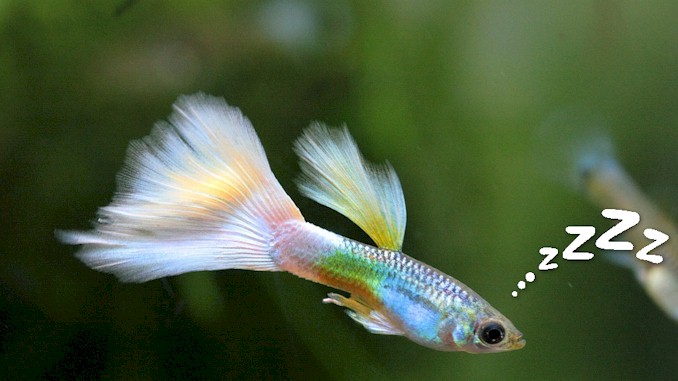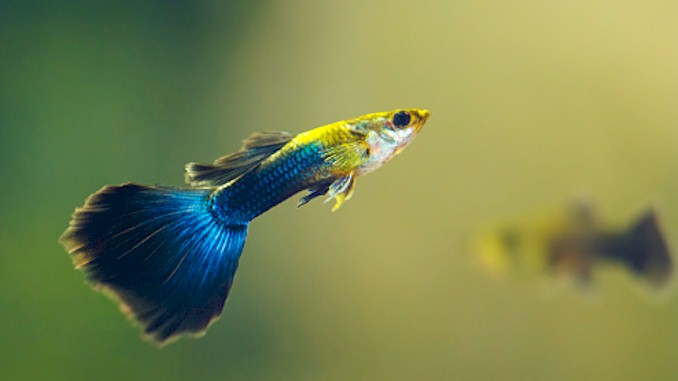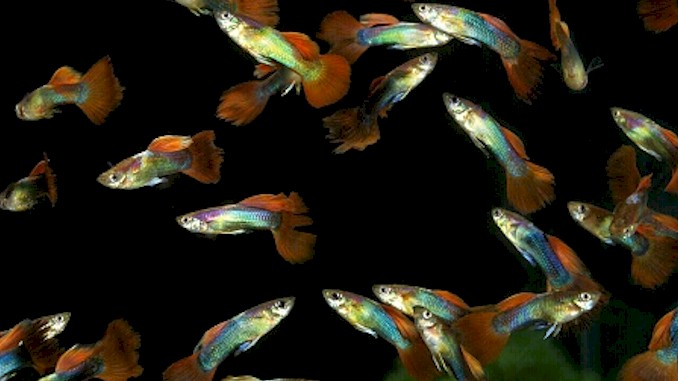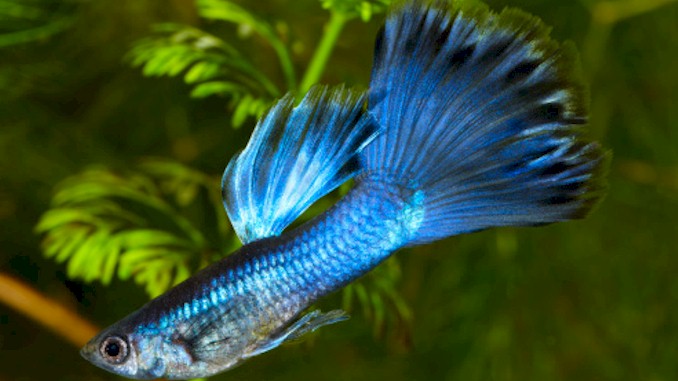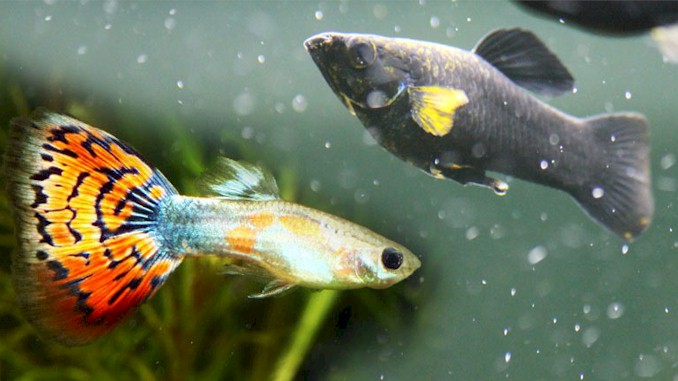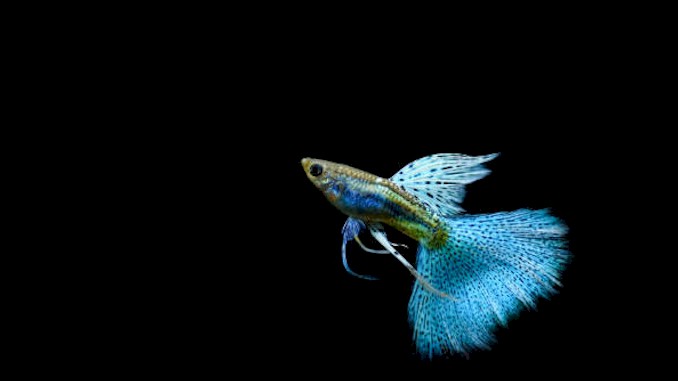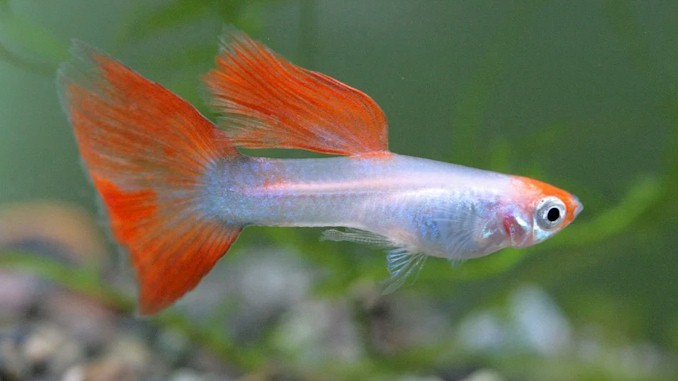The Fascinating World of Guppy Sleep: Everything You Need to Know
These are some of the questions that many guppy owners ask themselves, how these colorful and lively fish sleep? Do they close their eyes? Do they need darkness? How long do they sleep? And how can you tell if they are sleeping or sick? I will share with you some fascinating facts about guppy sleep behavior and how to provide the best sleep environment for your guppies. As a guppy enthusiast and expert, I have researched and observed guppies for many years and I have the answers you need. Read on to discover the fascinating world of guppy sleep!
Guppies sleep 7-8 hours/day, mainly at night or when lights are off. They need darkness to sleep since they lack eyelids. They fall asleep off in different parts of the tank, including at the bottom, on plants, or in a hiding place among the decorations, motionless, but fins and tails may rarely twitch.
Now that you know more about guppy sleep behavior, you might be wondering how to provide the best sleep environment for your guppies. How can you create a natural light cycle for them? What are some factors that can affect their sleep quality and quantity? How can you prevent or treat guppy sleep deprivation and its consequences? These are some of the questions that I will answer in the following sections of this blog post. As a guppy lover and expert, I have gathered a lot of useful tips and tricks that will help you improve your guppies’ sleep and overall health. So don’t stop reading now! You will be amazed by what you will learn next!
How Do Guppies Sleep? The Basics of Guppy Sleep Behavior
Guppies are amazing fish that have a unique way of sleeping. Unlike humans and other animals, guppies do not have eyelids, so they cannot close their eyes when they sleep. Instead, they rely on darkness to fall asleep. Guppies are diurnal fish, which means they are active during the day and sleep at night. They follow the natural light cycle to regulate their sleep patterns3. They need about 7-8 hours of sleep every day3, depending on their age and individual preferences.
Guppies sleep in various locations in the tank, such as on the bottom, on the surface, or in hiding places. They usually choose a spot where they feel safe and comfortable. Guppies remain motionless when they sleep but may twitch their fins and tails slightly during their sleep2. They also slow down their breathing and metabolism and lose some of their coloration when they sleep1.
Guppies can be distinguished from sick or dying guppies by their regular sleeping patterns and their responsiveness to light and other stimuli. Guppies usually go to bed around 10 p.m. and wake up around 6 a.m., although there is some variation based on the individual guppy’s age and habits. They will usually stay in one spot for most of the night, which can make it hard to tell if they are really sleeping or just resting4. If you notice any changes in your guppies’ sleeping behavior, such as sleeping more or less than usual, sleeping at unusual times or places, or not waking up when exposed to light or noise, you should check on them and make sure they are not sick or stressed.
Guppy sleep behavior is not only interesting but also important for their health and well-being. Sleep helps guppies conserve energy, repair tissues, fight infections, regulate hormones, improve memory, and maintain mood. Lack of sleep can cause guppies to become stressed, weak, sick, aggressive, or depressed. Therefore, it is essential to provide your guppies with a good quality and quantity of sleep every day.
In this section of the blog post, you learned about how guppies sleep; why they need darkness to fall asleep; where they prefer to sleep; how they look like when they sleep; how to tell if they are sleeping or sick; and why guppy sleep is important for their health. In the next section of this blog post you will learn how to create a natural light cycle for your guppies that will help them get enough restful sleep every night.
How Do You Know If Your Guppy Is Sleeping?
Guppies are adorable fish that have a unique way of sleeping. Unlike humans and other animals, guppies do not have eyelids, so they cannot close their eyes when they sleep. Instead, they rely on darkness to fall asleep. Guppies are diurnal fish, which means they are active during the day and sleep at night3. They follow the natural light cycle to regulate their sleep patterns3.
But how can you tell if your guppy is sleeping or sick? Sometimes it can be hard to tell the difference between a sleeping guppy and a dying guppy. Both may look motionless, pale, and unresponsive. However, there are some signs that can help you distinguish between a healthy sleeping guppy and a sick or dying guppy.
One sign is the regularity of their sleeping patterns. Guppies usually sleep for about 7-8 hours every day, depending on their age and individual preferences. They usually go to bed around 10 p.m. and wake up around 6 a.m., although there is some variation based on the individual guppy’s age and habits. They will usually stay in one spot for most of the night, which can make it hard to tell if they are really sleeping or just resting. If you notice any changes in your guppies’ sleeping behavior, such as sleeping more or less than usual, sleeping at unusual times or places, or not waking up when exposed to light or noise, you should check on them and make sure they are not sick or stressed.
Another sign is their responsiveness to stimuli. Guppies may look like they are not moving when they sleep but they are still aware of their surroundings. They may twitch their fins and tails slightly during their sleep. They may also react to light and other stimuli by moving away or becoming more alert. If you shine a light on your sleeping guppies or tap on the glass of your aquarium gently (not too hard!), you should see them move away from the light source or become more active. However, if your guppies do not react at all to any stimuli even when exposed to light for a long time (more than 15 minutes), they may be sick or dying.
A third sign is their appearance. Guppies lose some of their coloration when they sleep but they do not lose all of it. Their colors may fade slightly but they should still be visible. Guppies also slow down their breathing and metabolism when they sleep but they do not stop breathing altogether. You should still see some movement in their gills and mouth when they sleep. However, if your guppies look very pale or white (almost transparent), have sunken eyes, clamped fins, bloated belly, red spots, fungus growths, parasites attached to them etc., then these are signs of illness or death.
If you suspect that your guppy is sick or dying rather than sleeping then you should act quickly by isolating them from other fish in a separate tank with clean water; checking the water parameters such as temperature pH ammonia nitrite nitrate etc.; adding aquarium salt medication antibiotics etc.; changing water frequently; feeding them high quality food etc.; consulting an expert veterinarian etc.
Guppy sleep behavior is not only interesting but also important for their health and well-being. Knowing how to tell if your guppy is sleeping or sick can help you provide them with better care and prevent any potential problems. In this section of this blog post you learned about how to know if your guppy is sleeping; what signs indicate that your guppy is healthy; what signs indicate that your guppy is sick; what actions you should take if your guppy is sick; In the next section of this blog post you will learn how to create a natural light cycle for your guppies that will help them get enough restful sleep every night.
What Are The Best Sleeping Conditions For Guppies?
Guppies are wonderful fish that need good sleeping conditions to stay healthy and happy. Guppies sleep for about 7-8 hours every day, depending on their age and individual preferences. They follow the natural light cycle to regulate their sleep patterns. They need darkness to fall asleep like us. Therefore, you need to replicate the natural light cycle for them by turning off the aquarium lights at night.
But darkness is not the only factor that affects guppy sleep. There are other factors that can influence guppy sleep quality and quantity, such as temperature, water parameters, hiding spots, tankmates, aquarium space etc. In this section of this blog post, you will learn about how to provide your guppies with the best sleeping conditions possible by considering these factors.
Temperature: You can help your guppy get the sleep it needs by keeping its tank at a temperature of 75 degrees Fahrenheit and providing a lot of hiding places for it to rest in. Guppies are tropical fish that prefer warm water temperatures between 72 and 82 degrees Fahrenheit. If the water temperature is too high or too low, it can stress your guppy and affect its sleep quality. You should use a reliable aquarium heater and thermometer to maintain a stable water temperature for your guppy.
Water parameters: You should also check the water parameters such as pH, ammonia, nitrite, nitrate etc. regularly and keep them within safe levels for your guppy. Guppies prefer slightly alkaline water with a pH between 7.0 and 8.0. They also need clean water with low levels of ammonia (0 ppm), nitrite (0 ppm), and nitrate (<20 ppm). High levels of these substances can harm your guppy’s health and cause stress which can interfere with its sleep. You should perform regular water changes (25% weekly) and use a good filter system to keep your water clean and healthy for your guppy.
Hiding spots: Guppies usually sleep in various locations in the tank, such as on the bottom, on the surface, or in hiding places. They usually choose a spot where they feel safe and comfortable. Guppies need hiding spots to escape from predators or aggressive tankmates as well as to rest peacefully during their sleep. You should provide your guppy with plenty of hiding spots such as plants (live or artificial), rocks, driftwood, caves etc. These will also make your aquarium more attractive and natural-looking.
Tankmates: Guppies are social fish that like to live in groups or schools. They get along well with other peaceful fish of similar size such as tetras mollies platies swordtails etc. However some fish may not be suitable tankmates for guppies because they may bully harass or eat them especially during their sleep when they are vulnerable Some examples of fish that you should avoid keeping with guppies are cichlids bettas goldfish angelfish etc. You should also avoid keeping too many male guppies together because they may fight over females or territory which can stress them out and affect their sleep quality A good rule of thumb is to keep one male per two females or more
Aquarium space: Guppies are active fish that like to swim around and explore their environment They need enough space to do so without feeling cramped or crowded by other fish or decorations A small tank can limit their movement cause stress lower oxygen levels increase waste accumulation etc. All these factors can negatively affect their health mood appetite reproduction behavior etc. As a general guideline you should provide at least one gallon of water per inch of fish but more is always better if possible.
By following these tips you can create the best sleeping conditions for your guppies that will help them get enough restful sleep every night Sleep is vital for their health well-being growth development etc. In this section of this blog post you learned about how to provide your guppies with the best sleeping conditions possible by considering factors such as temperature water parameters hiding spots tankmates aquarium space etc.
How To Create A Natural Light Cycle For Your Guppies?
Guppies are diurnal fish, which means they are active during the day and sleep at night. They follow the natural light cycle to regulate their sleep patterns. They need darkness to fall asleep like us. Therefore, you need to replicate the natural light cycle for them by turning off the aquarium lights at night.
But how can you create a natural light cycle for your guppies? There are two main ways to do this: using natural sunlight or using artificial lights. Both methods have their advantages and disadvantages, so you should choose the one that suits your situation best.
Using natural sunlight: If your aquarium is in a room with adequate natural light, such as a living area with plenty of windows, you may not need to worry about adding artificial light to your tank. Natural sunlight is healthier for guppies, helping adults and fry grow larger and develop more vibrant colors. Natural sunlight also fosters algae growth in the tank, which provides a natural food source for your guppies.
However, too much direct sunlight can be harmful to your guppies, as it can overheat the water and kill them. You should avoid placing your aquarium near windows that receive direct sunlight for long periods of time. You should also use curtains or blinds to control the amount of sunlight entering your room. You should aim for about 8-10 hours of light each day for your guppies, but this can vary depending on the season and location.
Using artificial lights: If your aquarium is in a room with little or no natural light, such as a basement or bedroom, you will need to use artificial lights to create a natural light cycle for your guppies. Artificial lights are more convenient and reliable than natural sunlight, as you can control their intensity and duration easily. You can use LED or fluorescent lights in your aquarium. LED lights use far less electricity than fluorescent bulbs, and have more color settings and features than fluorescents. They also don’t heat up the water like fluorescents do.
You should buy an aquarium light that is suitable for the size of your tank and has a timer function. A timer will allow you to set when the lights turn on and off automatically every day. This will help you mimic a regular and consistent light cycle for your guppies without having to remember it yourself. You should aim for about 8-10 hours of light each day for your guppies, but this can vary depending on their age and preferences.
By creating a natural light cycle for your guppies, you will help them get enough restful sleep every night. Sleep is vital for their health, well-being, growth, development etc. In this section of this blog post you learned about how to create a natural light cycle for your guppies by using either natural sunlight or artificial lights; what are the advantages and disadvantages of each method; how much light do guppies need each day; how to use timers to automate the lighting schedule etc.
What Factors Can Affect Guppy Sleep Quality And Quantity?
Guppy sleep quality and quantity are important for their health and well-being. Sleep helps guppies conserve energy, repair tissues, fight infections, regulate hormones, improve memory, and maintain mood. Lack of sleep can cause guppies to become stressed, weak, sick, aggressive, or depressed. Therefore, it is essential to provide your guppies with a good quality and quantity of sleep every day.
But what factors can affect guppy sleep quality and quantity? There are many factors that can influence how well and how much your guppies sleep. Some of these factors are internal, such as age, sex, genetics etc. Others are external such as light cycle temperature water parameters hiding spots tankmates aquarium space etc. In this section of this blog post you will learn about some of the most common factors that can affect guppy sleep quality and quantity and how to deal with them.
Light cycle: Guppies follow the natural light cycle to regulate their sleep patterns. They need darkness to fall asleep like us. Therefore you need to replicate the natural light cycle for them by turning off the aquarium lights at night. You should aim for about 8-10 hours of light each day for your guppies, but this can vary depending on their age and preferences. Too much or too little light can disrupt their circadian rhythm and affect their sleep quality and quantity You should use a timer to automate the lighting schedule or use natural sunlight if possible.
Temperature: Guppies prefer warm water temperatures between 72 and 82 degrees Fahrenheit If the water temperature is too high or too low it can stress your guppy and affect its sleep quality. You should use a reliable aquarium heater and thermometer to maintain a stable water temperature for your guppy.
Water parameters: Guppies need clean water with low levels of ammonia (0 ppm), nitrite (0 ppm), nitrate (<20 ppm), pH (7-8) etc. High levels of these substances can harm your guppy’s health and cause stress which can interfere with its sleep. You should perform regular water changes (25% weekly) and use a good filter system to keep your water clean and healthy for your guppy.
Hiding spots: Guppies usually sleep in various locations in the tank such as on the bottom on the surface or in hiding places They usually choose a spot where they feel safe and comfortable. Guppies need hiding spots to escape from predators or aggressive tankmates as well as to rest peacefully during their sleep You should provide your guppy with plenty of hiding spots such as plants (live or artificial) rocks driftwood caves etc. These will also make your aquarium more attractive and natural-looking.
Tankmates: Guppies are social fish that like to live in groups or schools They get along well with other peaceful fish of similar size such as tetras mollies platies swordtails etc. However some fish may not be suitable tankmates for guppies because they may bully harass or eat them especially during their sleep when they are vulnerable Some examples of fish that you should avoid keeping with guppies are cichlids bettas goldfish angelfish etc. You should also avoid keeping too many male guppies together because they may fight over females or territory which can stress them out and affect their sleep quality. A good rule of thumb is to keep one male per two females or more.
Aquarium space: Guppies are active fish that like to swim around and explore their environment. They need enough space to do so without feeling cramped or crowded by other fish or decorations. A small tank can limit their movement cause stress lower oxygen levels increase waste accumulation etc. All these factors can negatively affect their health mood appetite reproduction behavior etc. As a general guideline you should provide at least one gallon of water per inch of fish but more is always better if possible.
By considering these factors you can improve your guppy’s sleep quality and quantity which will benefit their health well-being growth development etc. In this section of this blog post you learned about some of the most common factors that can affect guppy sleep quality and quantity;
Related Questions:
Do Guppies Sleep At The Bottom Of The Tank?


Yes, guppies do sleep at the bottom of the tank. When guppies sleep, they may rest on the bottom, surface, or in hiding places, depending on their preference and the availability of suitable spots in the tank. It’s important to provide your guppies with a clean and comfortable substrate, such as sand or gravel, that allows them to rest comfortably at the bottom of the tank. Additionally, providing hiding places and plants in the tank can give your guppies a sense of security and help them feel more comfortable while they sleep.
However, sometimes guppies may stay at the bottom of the tank because of other reasons such as stress, poor water conditions, temperature shock, swim bladder disease, or other illnesses. If you notice any signs of abnormal behavior or appearance in your guppies, you should check your water quality and consult a veterinarian if needed.
Do Guppy Fry Sleep?
Yes, guppy fry do sleep. As with adult guppies, they require rest to grow and develop properly. However, the sleeping patterns of fry may differ from those of adults, and they may sleep more frequently throughout the day. It’s important to provide a suitable environment for fry to rest and grow, including clean water and adequate hiding places.
Do Guppies Sleep Upside-Down?
It’s not common for guppies to sleep upside-down. When guppies sleep, they typically rest on the bottom, surface, or in hiding places, and appear motionless but may twitch their fins and tails slightly. If you notice your guppy sleeping upside-down, it could be a sign of illness or stress, and it’s important to monitor their behavior and consult with a veterinarian if necessary.
Can Guppies see in the dark?
While guppies can see in low light conditions, they cannot see in complete darkness. Guppies have specialized cells in their eyes called rods and cones, which allow them to perceive light and color. However, these cells require some level of light to function properly. In the absence of light, guppies may rely on their other senses, such as their sense of smell or hearing, to navigate their environment.
Do Guppies sleep in the light?
Guppies typically do not sleep in bright light as they require a dark environment to rest properly. It’s recommended to provide a regular light cycle for your guppies by turning off the aquarium lights during the night or for a period of 8 hours daily. This helps to establish a natural sleep-wake cycle for the guppies and ensures that they get enough rest to remain healthy and active. However, it’s important to note that occasional exposure to light during sleep may not harm the guppies, but prolonged exposure to bright light can lead to stress and sleeping problems.

